Here are selected excerpts from the presentations on September 21, 2011 at Busboys and Poets in Hyattsville at the dedication of the Zinn Room and fundraiser for the Zinn Education Project.
Dave Zirin
“Something Howard always said, ‘It doesn’t matter who’s sitting in the White House, it matters who’s sitting in.’”
“That was Howard’s great gift to us… the gift that sits with me right now… it’s not about ‘great men,’ usually great white men, who from on high make history… Howard taught us that it was the masses of people who are actually the engine of history, and that’s what the Zinn Education Project is now fighting to preserve for our classrooms. This idea that says history is not made by kings and princes and people from far off lands and people in this country who have fancy titles, but it’s made by ordinary people every single day who find the courage to do extraordinary things. That’s the legacy of Howard Zinn. And that’s what both this room and the Zinn Education Project are trying so hard to preserve.”
William Holtzman
“Listening to Howard teach, not in the political environment but in the teaching environment, was really something amazing, in the sense that he was very gentle. He was very whimsical, and yet he was delivering incredibly strong remarks, and really advocating moving forward and getting involved. I took several classes with him and there’s no question he was spellbinding. I could even recite chapters and verse from a lot of his presentations…”
“In the documentary about his life [You Can’t Be Neutral on a Moving Train] I was quite struck by the scene where Howard goes to an inner-city school in Chicago… that really got my attention… So after a little bit of up and back we decided the focus would be education and in particular, supporting teachers, because God knows, teachers aren’t getting a lot of support these days. So Howard introduced me to Teaching for Change and Rethinking Schools. That was about four years ago, and after that introduction, we took about six months and we created the Zinn Education Project. One thing I didn’t realize at the time (and I heard this from Howard’s daughter Myla), is that there was no Zinn organization anywhere. Howard had never put his name against anything. So this was a surprise and obviously a great honor, and I guess it really speaks to Howard’s feelings about education and supporting teachers… so far we have about 14,000 registered teachers, and given our running rate, we should be about 20,000 by the end of the year.”
“So the bottom line question is: Do we need the Zinn Education Project? And the answer comes, courtesy of Holt MacDougal, one of the major educational publishers, and their new book, The Modern World History. This is distributed across the United States. We go to the Iraq section; the second war in Iraq. You can see this incredibly glossy, simplistic overview of that war, referencing terrorism, which we all know is not the case, and in the end of that lesson there’s a section called ‘Critical Thinking and Writing.’ This is the assignment to the students: ‘Imagine you are a speech writer for President Bush. Write the introductory paragraph of a speech to coalition forces after their victory in Iraq.’ So that’s critical thinking, corporate education style, and that is what’s coming out of Texas. That’s why you’re here today.”
Lauren Cooper
“I work at Teaching for Change. I also am one of the coordinators for the Zinn Education Project, which has been a gratifying experience, because teachers all across the country are using the materials to teach in their classrooms that I wish my teachers had used. Being American Indian in Phoenix, Arizona — Arizona had the second largest population of American Indians — I remember sitting in middle school history class and reading a couple paragraphs about how some Indians came and went during the westward expansion. And we’re sitting here in the classroom thinking “We’re right here! We’re still alive!” But I would never say anything, because we had also read about how some Indians foolishly sold their lands, or gave it up for some beads and pennies, or they couldn’t defend themselves against the U.S. military. So I would just sit there, waiting for the moment to pass. It wasn’t until I read A People’s History that I felt a sense of dignity that I’d never got from any other book.”
Watch part of Lauren’s talk here.
Barbara Ehrenreich
“This is what [Francis Fox Piven] told me: The thing you have to emphasize about Howard is that he was not a martyr. He never saw himself that way. In all his years of activism & scholarship, you know, getting fired from jobs, being arrested, all those things… certainly there must have been times he would have preferred being home growing tomatoes, which is what he liked to do, but he was always having fun.”
Medea Benjamin (with CodePink)
“I was a nice Jewish girl growing up in a very conservative Long Island suburb until I started to read Howard Zinn’s writings about the war in Vietnam, and that got me on quite a path. Also, thanks to Teaching For Change, I just wanted to pay tribute to another book that changed my life, and that was one by Walter Rodney called “How Europe Underdeveloped Africa.” So we all in this room know how important books are, and how they take minds of young people and turn them into minds of activists, and I feel just so honored and privileged to have read such incredible books as I was growing up.”
Cindy Corrie
“I want to say a little bit about Howard Zinn. I didn’t have the opportunity, Craig and I did not have the opportunity, to know your dad [looking at Jeff Zinn in the audience] personally. We knew of him, of course, but we were kind of quiet activists. Our daughter Rachel really brought us to these issues. But immediately after Rachel was killed, in the first hours of the first days, there was an email to us from Howard Zinn. I remember feeling at the time, even as dazed as we were by what had happened, how amazing it was that this person, who was just a legend in our minds, had taken the step to write to us. And to share his compassion and his care for our family, and his recognition of the stand that Rachel took that day in Gaza. It’s so helpful for me to hear from you that he was, with you, the same person that we all saw in films and videos. Wherever he was, that’s who he was. That’s what he conveyed to me in that message we received. I started to realize that it was the history that people like Rachel, and others, like people in this room, were making, that was what mattered to him, and what he believed could make the most difference in the world. I’ve been very fortunate, because Anthony Arnove and Howard Zinn, in Voices of a People’s History, chose to include Rachel’s voice. They then invited me to read from that at a number of different presentations, and it was a gift because it not only allowed me to share Rachel’s words, but also to really internalize a lot of the words of so many others that are represented in those volumes. Howard wrote, “What is common to all these voices is that they have mostly been shut out of the orthodox histories, the major media, the standard textbooks, the controlled culture. The result of having our history dominated by presidents and generals, and other ‘important’ people, is to create a passive citizenry; not knowing its own powers, always waiting for some savior on high, God or the next president, to bring peace and justice.” I thank Howard Zinn. I thank him for showing us that our voices matter, and that the trajectory of this world depends on what we have to say and what we do.”
Marian Wright Edelman
“I feel very lucky to have been [Howard Zinn’s] student. He was a very creative, magical teacher. He taught us how to think for ourselves, to analyze, to question what we read, and speak truth to power. He was just engaging in every way… I don’t think I would have survived at Spelman in the late 50s without Howie. But he was extraordinary. He didn’t just teach; he lived what he taught. He gave us opportunities to read our history and to go to our first generation discussions down at the YWCA. He made sure that we were able to have the opportunities to challenge segregation, whether it was in the public libraries or it was in Atlanta theaters or movies. I enjoyed our annual troop to the Georgia State Legislature, where we would sit in the whites-only gallery with Howie and stop the entire proceedings…”
“[Howard Zinn] was a real mensch. He made us feel empowered. He instilled in us the need to make a difference in the world and to speak truth to power… He was not liked by our administration…by a lot of administration…but we students loved him. He was always accessible… He never tried to tell us what to do. He just helped us feel encouraged and empowered, and when we got weak and a little bit uncourageous he would straighten our backs back up… I also just appreciated his great respect for me as a young black girl from a little segregated town.”
“[Howard Zinn] has just irrevocably shaped my life and I’m profoundly grateful, just as his A People’s History of the United States has shaped the lives of millions and will shape the lives of millions in the future.”
Jared (Hipkins’ student)
“Last year, in my junior year, I came up to Mr. Hipkins, and he introduced us to People’s History of the United States. I had never heard about Howard Zinn until then, and I was really excited to learn some new things about history, so I started reading it and then…my hero [Christopher Columbus] tried to kill a whole civilization. So I was asking myself, is everything that I learned back then true? Nowadays, I don’t really trust everything I learn. I have to research more, and I have to know every single detail. My mom sometimes sends me to go to sleep. I go into my room, get in my bed, and when I hear that she falls sleep, I turn on my lamp and start reading A People’s History. I like to read it for fun, but sometimes it’s because I want to confirm something that I learned at school. Howard Zinn has really opened my eyes and helped me see the real history of the United States, and I want to say thank you for that. Surprisingly, it’s also helping me this year in my history topic. We’re learning about U.S. Government. It’s also helping me learn some new perspectives that I didn’t really know. I’m proud to be one of the students who actually got to use A People’s History of the United States.
Jonah (Hipkins’ student)
“But then, in Mr. Hipkins’ class we actually got the book [A People’s History of the United States], which turned out to sort of the bible of the history of the United States…! It’s much more comprehensive than any individual other piece I’ve seen so far. It’s so direct, and focused and deliberate and insightful. But past that, it’s told through his lens of the people, of the lower class, the disenfranchised, which I feel is one of the first things we need to do if we’re trying to fix up the country…I hope we can follow Howard Zinn’s example.”
Julian Hipkins III
“So, I got the textbook [A People’s History of the United States], students are ready to read it, now I have to figure out how am I going to teach it? So I go home one night, I’m looking at Zinn, you know, People’s History lessons, and the Zinn Education Project website came up. And I started looking through, and I said, “This is exactly what I’ve been looking for!” I have so many great things to say about this website. Today, I met Bill Bigelow, and I started shaking his hand, and then I just completely started hugging him… But thank you so much for all the wonderful lessons you’ve planned. I’ve used them so many times in my classroom… I don’t know where I would be without this website; the Zinn Education Project because it’s helped me so much in my lessons. It’s helped me really bring “A People’s History” to light… The textbook is so powerful, for me it allows citizens of the United States and the world to look back on history and all the unpleasant things the U.S. government has done and hopefully, move forward in the future and not allow these terrible things to happen again.”
Watch part of Mr. Hipkins’ talk here.
Beverly Daniel Tatum
“When I was teaching about the psychology of racism … I often referred students to read A People’s History of the United States… So fast forward to 2002 and I am the ninth president of Spelman College… And when I got to Spelman I learned about an infamous act on the part of president number five. President number five was Dr. Albert Manley, who was president for more than 20 years. He was president during the time of the civil rights era…and when Howard Zinn was a professor there. And it was Dr. Manley who fired Howard Zinn as tenured history professor, as legend has it, for insubordination… Well fast forward: In 2004, there was a sociology professor at Spelman during my tenure, Professor Harry Lefever, who wrote a book about Spelman women and history of the civil rights movement called Undaunted by the Fight. In the spring of 2004, Harry’s book was published, and as part of the celebration of that, and also the 40th anniversary of the Civil Rights Act, he invited Howard Zinn back to speak. I was so excited, you know my personal history; I was really excited to have this opportunity to hear Howard Zinn speak. He came and he said, “You know, this is the first time I have been here in forty years; the first time since I was fired. And actually, it was as he told that story, it was the first time that I learned this particular piece of Spelman history and I decided then that we needed to clean that up. So in May 2005, we invited Marian Wright Edelman to be our [Founder’s Day] speaker, and we invited Howard Zinn to receive an honorary degree…and it was actually Howard who was the commencement speaker. It was really a wonderful experience…many of his former students were back for their reunions…it was wonderful to see his former students who had been so influenced by him to be able to be reunited in this space as he was being honored by this institution that had treated him so badly.”
“But I did want to… just read an excerpt from [Zinn’s] speech which was published in our ‘Inside Spelman’ back in the summer of 2005…I think it’s especially fitting given that today is International Peace Day… He said, “My first hope is that you will not be too discouraged by the way the world looks at this moment. It is easy to be discouraged because our nation is at war. But let me tell why you must not be discouraged. My hope is that your generation will demand an end to war. That your generation will do something that has not yet been done in history: To wipe out the national boundaries that separate us from other human beings on this earth. I was on the faculty of Spelman College for seven years, from 1956 to 1963. My wife Roslyn and I and our two children lived on campus. Those years at Spelman were the most exciting years of my life; the most educational, certainly. I learned more from my students than they learned from me. I learned something about democracy. That it does not come from the government from on high, it comes from people getting together and struggling for justice. I was lucky to be at Spelman at a time when I could watch a marvelous transformation in my students. When they were so polite; so quiet, and then suddenly they were leaving the campus and going into town, and sitting in and being arrested, and then coming out of jail full of fire and rebellion… One day Marian Wright, now Marian Wright Edelman, who was my student at Spelman, and was the first arrested in the Atlanta sit-ins, came to our house on campus to show us a petition that epitomized the transformation that was taking place at Spelman College. Marian had written on top of the petition: ‘Young ladies who can picket, please sign below.’ My hope is that you will not be content to just be successful in the way that our society measures success; that you will not obey the rules when the rules are unjust, that you will act out the courage that I know is in you. By being here today, you are already standing on your toes, ready to lead. My hope for you is a good life.”
Cornel West
“Howard Zinn was a good man. He was a great man. He wasn’t great like Alexander the Great. He wasn’t great like Napoleon. He didn’t conquer. He mustered the courage to be sensitive to the pain of people’s suffering. And he lived it. He connected the struggle for justice with finding joy in serving others, so that the process had something to do with the profit. And that’s the best that America has to offer.”
“Howard Zinn understood the real secret of being a long distance runner for justice. He knew there was an intimate relation between the social and the spiritual. By spiritual, what I mean is being able to sustain your commitment…so that you’re a marathon. He understood the relationship between the political and the personal, even before the feminist movement hit strong…He was that humble radical… I’m talking about the one that has fallen in love with those called everyday people…”
“That’s the Howard Zinn we talking about. I knew him for 41 years. We went to jail together. We laughed together. We tried to sing together… and I’ll never forget the spirit of him. The connection between the economic and the existential. He was the kind of brother you wanted to go to jail with. You had fun in the cell with. Partly because he was an intellectual… He fundamentally believed that the life of the mind matters, that ideas make a difference, and it’s important that you commit yourself not just to reading, but to thinking critically about what you’re reading… There will never be a movement in America that doesn’t take seriously the life of the mind! A public intellectual, a democratic intellectual, a radical intellectual, but still humble enough to use what he had in service for what we in the black church call, ‘The least of these.'”
Watch an excerpt from Dr. West’s talk here.
Appreciation to Jozi Zwerdling for the transcriptions.

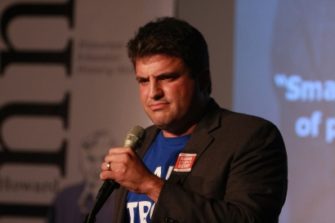
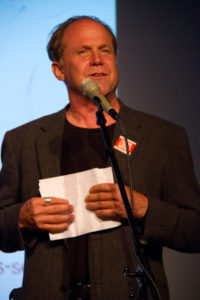
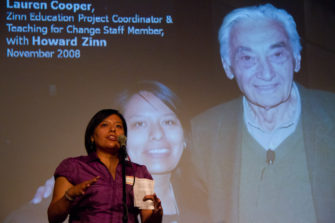
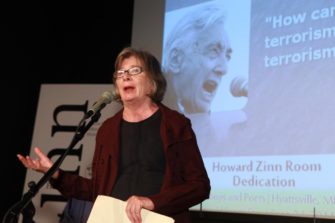
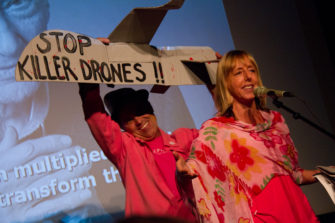
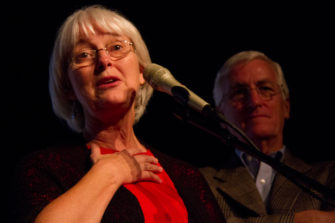
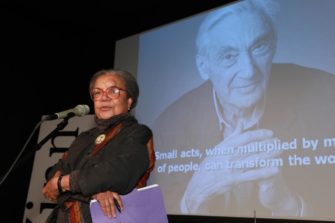
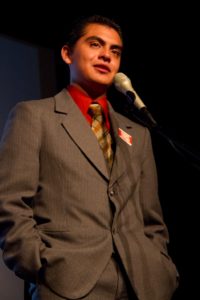
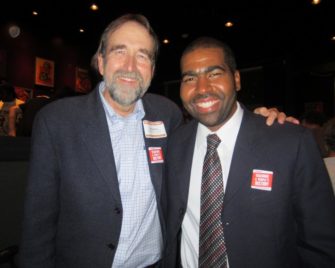
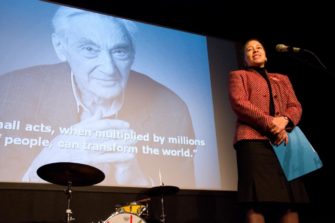
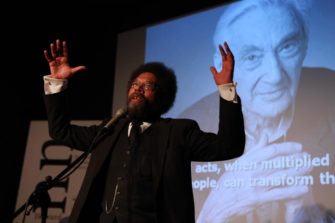





Twitter
Google plus
LinkedIn